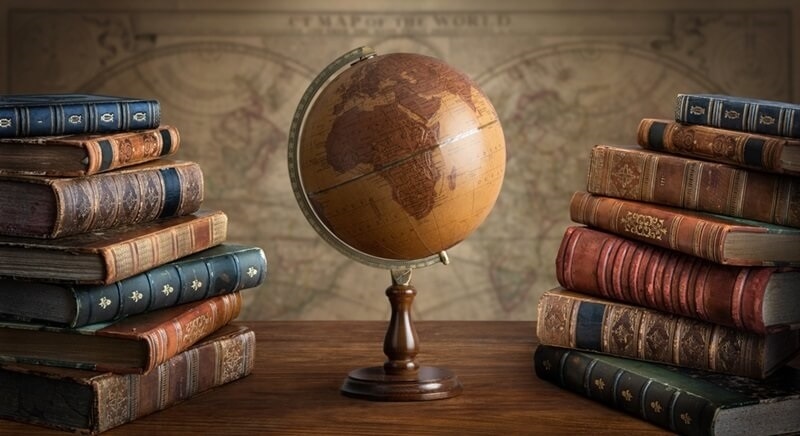
Stories can bridge boundaries, timelines and move hearts. Writers around the world reproduce experiences, feelings and dreams in their own languages in every corner of the world. However, unless translated, chances are that these voices may not be captured outside their borders. World literature also enables the reader to travel through cultures, explore new worlds of perception and the universality of the human heart. Literature translation work opens the rich tapestry of global storytelling to us and provides us with an opportunity to understand lives that are quite distant from our own.
World literature is not merely a list of books from other nations. It is a bridge linking different minds, hearts and histories. Reading from other countries, we understand how people in other countries think, live and feel. Thanks to literature translation, we can experience the voices of the world, and we can get entertained as well as get enlightened.

Literature and translation go hand in hand. Through literature translation, many masterpieces would be locked down in native languages. Translators do not simply transfer the words but the feelings, cultural undertones and the aesthetics of a certain language into another. This gives a sense of life and familiarity to the work that is translated, despite the fact that its settings and traditions are quite different in relation to what we know.
When one reads world literature, one way is that it opens their mind. A Japanese story could lead us to think about being alone and living in society, a story about a South American could teach us something about passion, strength, or family. World literature is a means to look at life from a different perspective, and it provides us with the experiences we may never get to experience personally.
Also read: The Cultural Importance of Book Fairs in Modern Society
Keeping the heritage of cultures of different cultures is one of the most critical functions of literary translation. Each story contains pieces of history, beliefs and principles of a society. Through translation of literature, we are sure that these cultural treasures are passed on to communities way beyond their birthplace.
Many ancient texts, from Sanskrit epics to Greek tragedies, survive today because of translation. Without translators, the wisdom, philosophy, and creativity of past civilisations would remain inaccessible. Through literature translation projects, modern readers can experience the thoughts and imaginations of people from centuries ago.
When we read translated works, we gain insights into cultural practices and perspectives different from our own. Understanding these differences fosters empathy and respect. Literature in the world acts as a window to other societies, helping us appreciate diversity while recognising shared human experiences.
Translators are often the unsung heroes of world literature. Their work is delicate and demanding, requiring skill, sensitivity, and creativity. A good translator conveys not only the literal meaning of a text but also its emotional depth and cultural context.
Translators face the challenge of preserving the author’s original voice while making it accessible in another language. A joke, a metaphor, or a cultural reference may not work in translation unless carefully adapted.
In many ways, translators are co-creators. While the original author crafts the story, the translator shapes how it is received by readers in a new language. Every decision—from word choice to sentence structure—can influence the tone, pacing, and emotional impact.
Suggested reading: Literature Across Borders: The Globalization of Book Culture
World literature is filled with gems that became accessible to English readers thanks to translation. These works have entertained, inspired, and challenged audiences worldwide.
Set in post-World War II Barcelona, this novel follows a young boy discovering a forgotten book that leads him into mystery and intrigue. Its lyrical prose and intricate plotting make it a captivating story that resonates with readers globally.
Murakami’s novel combines surrealism with deep human emotion. Themes of love, loss, and existential reflection take readers on a journey through both the subconscious and the everyday, showing the universality of human struggles.
Coelho’s allegorical story follows a shepherd on a journey to realise his dreams. Its message of personal growth and courage has touched readers worldwide, proving that simple yet profound storytelling transcends language.
Salih’s narrative explores identity, colonial history, and cultural conflict. Through translation, this powerful novel introduces readers to post-colonial African perspectives, offering a story that is both regionally specific and universally relevant.
Translating literature is a complicated task, although the benefits are present. The translators are forced to manoeuvre through language, cultural subtexts, emotion, and the whole story without losing the meaning of their work.
Explore more: Preserving Literary Heritage: Libraries and Archives' Role
The process of reading translated literature is very emotional. It enables the reader to relate to lives and cultures that are so different, and yet they know that universal human feelings, feelings like love, grief, and hope, must feel universal.
When a book is translated well, then a foreign story becomes a familiar one. A girl in India, a farmer in Peru or a poet in Japan might appear a long way away, but their feelings are close to the heart.
Reading with the perspective of foreign characters helps readers to develop compassion and appreciation. These experiences so instruct us that even though cultures, geography, or language vary, the experience of the human experience is common.
Richly nourished by translation, world literature provides readers with an opportunity to learn, identify and develop. These tales cut across boundaries and time, as old epic tales give way to the new novels. Through such support of translated literature, we glorify the diversity of world narration, develop compassion and preserve cultural heritage. All the books that are translated are not just stories--they are a link between the hearts of people all over the world. With its translation of literature, the world still speaks through its voices, and we are alerted that there are no borders in stories but just universality. We should glorify and accept world literature, book by book.
This content was created by AI